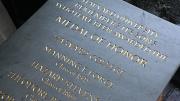Hazard Stevens, of the class of 1865, led the assault that captured a Confederate fort. Leonard Wood, M.D. ’84, volunteered to carry dispatches through Apache territory, traveling 70 miles in one night and walking 30 more the next day. Sherrod Skinner ’51 threw himself on a North Korean grenade to save wounded marines under his command. They are among the 10 Harvard men awarded the Congressional Medal of Honor for “conspicuous gallantry and intrepidity” at the risk of their own lives “above and beyond the call of duty.” Recent research suggests that no other college or university, apart from West Point and Annapolis (with 82 and 74 recipients), can claim more alumni so honored.
On November 11, Veterans Day, at an 11 a.m. service at Memorial Church, a plaque commemorating these men will be unveiled, dedicated, and presented to the University for installation in the sanctuary. The Reverend Peter J. Gomes, who teaches a course in Harvard history, will officiate, and President Drew Faust, a Civil War scholar, will participate. The plaque is a gift from the more than 500 members of the Harvard Veterans Alumni Organization (HVAO; www.harvardveterans.org), a group sponsored by the Harvard Alumni Association; the ceremony is sponsored by HVAO, Advocates for Harvard ROTC, and the Business, Kennedy, and Law Schools’ armed forces clubs.
The plaque, says HVAO president Thomas P. Reardon ’68, is part of a Harvard Veterans History Project documenting “the 12 generations of Harvard men and women—the ‘Long Crimson Line’—who have served in the military of our country from Colonial times through every war and peace since.” (Research by Paul E. Mawn ’63, chairman of Advocates for Harvard ROTC, determined Harvard’s Medal of Honor ranking.) The University’s other Medal of Honor recipients are: Theodore Roosevelt, A.B. 1880, and Theodore Roosevelt Jr., A.B. 1909, for leadership at San Juan Hill in 1898 and on D-Day in 1944; Manning F. Force, A.B. 1845, LL.B. ’48, and Henry W. Lawton, L ’66, who served with Sherman’s Georgia campaign in 1864; Walter N. Hill, class of 1904, who led marines at the battle of Veracruz in 1914; and George G. McMurtry, class of 1899, and Charles W. Whittlesey, LL.B. 1908, commanders of the “lost battalions” that held out in the Argonne against German forces for a week in 1918 before rescue (details at www.advocatesforrotc.org/harvard/honor.html).









